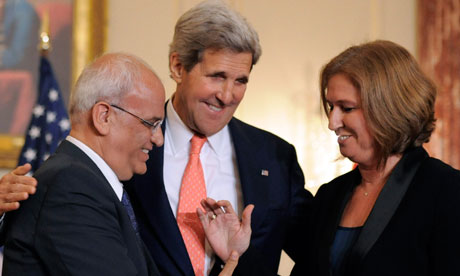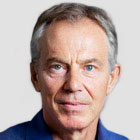Take it away, Tony!
There is hope for the future amid the turmoil of the Middle East
Last week's revival of the Israeli/Palestinian peace process proves that the region's problems can be resolved

John Kerry brings Israeli justice minister Tzipi Livni (right) and chief Palestinian negotiator Saeb Erekat together in Washington on 30 July. Photograph: Mike Theiler/EPA
Syria is a living nightmare. Egypt hovers on the brink. But as last week's breakthrough in the Middle East peace process shows, there are signs of optimism. And counter-intuitive though it is to say so, underneath all the turmoil, the fundamental problems of the region are finally being brought to the surface in a way that allows them to be confronted and overcome. For us, now is the time not for despair, but for active engagement.
Whoa!... "fundamental problems of the region?" Do you mean the last two hundred years of colonialism, economic imperialism... and for lack of a better word, "active engagement?"
No one put the chances of reviving the Middle East peace process at more than minimal. Last week, in Washington, it happened. And not talks about talks, but full-blown reignition of final status negotiations, with an undertaking by both parties to stay in the process for at least nine months. To those of us who have toiled, often fruitlessly, over the past years on this issue, it is a huge achievement brought about by John Kerry, with sheer dogged determination, and the two leaders, by taking risks with their public opinion.
"Full blown final status negotiations" indeed... Abbas made a nine month commitment because the release of the 104 prisoners was staggered over nine months. Obama wants a nine months commitment so he can look like a peace-maker in the next election cycle, and Netanyahu doesn't mind playing along because he knows the negotiations mean nothing one way or the other.
Much less noticed was the visit of the Yemen president to Washington. In Yemen, against all the odds, the country is going through a process of political transformation, with 500 delegates from all parts of society working on plans for democracy, justice and equality.
Even less noticed is that the Yemeni president is increasingly isolated because his friends in Washington insist on using his country as a drone free-fire zone.
In Iraq, after years where the sectarian violence declined year on year, the casualty figures are back up again, in part through the war in Syria. Yet even here, there was recently a seminal statement from Najaf by the Grand Ayatollah Ali al–Sistani, the most influential Shia cleric in Iraq, proclaiming the need for a civil, not religious state, in which all people had equal freedom to participate and disagreeing with those close to Iran who want Shia to go to Syria to fight for Assad alongside Hezbollah.
The most influential Shia clerics in Iraq are all in Iran.
At the commencement of Ramadan, the king of Saudi Arabia, who is also the keeper of the two holy mosques, made a powerful statement reclaiming the faith of Islam from those who would pervert it, in the name of politics.
Yes, the king of Saudi Arabia is as given to making grandiose nonsensical statements as you are, Tony.
Libya and Tunisia are far from settled, as the assassination of theleading opposition politician in Tunisia and the presence of unrestrained militia in Libyan towns, show. But the democrats aren't giving up. Across the bulge of the northern part of sub-Saharan Africa there are huge challenges now from well-armed and financed terrorists groups that have imported this toxic ideology from the Middle East. Countries such as Nigeria have suffered horribly from a terror based on religious extremism that is alien to their society. But again, despite it all, the country is experiencing rapid economic growth and there has just been a major reform of the power sector, something people thought impossible a short time ago.
Which "democrats" would those be, Tony? The democrats working overtime at the behest of Whitehall and Washington to undo the results of democratic elections in Tunisia and Egypt? As for the "reform" of Nigeria's power sector, I think you meant to say "privatization." This is more of a concern to your City pals than it is to the people of Nigeria.
Egypt could pivot back towards democracy, with a constitution that is genuinely inclusive and objectively administered. There is the promise of elections by early 2014 and all parties, including theMuslim Brotherhood, could take part. Or it could become paralysed, incapable of moving forward, unable to rectify the dire economic situation and restore order, without which no progress is possible.
What was wrong with the elections of 2012?
But the very divisions in Egypt illustrate a deeper awakening in the region that has its own significance. Lessons about government, governance and democracy that took the west centuries to learn are being taken in at extraordinary speed.
How ironic that "the region" is discovering democracy just as we're waving it good-bye in the West.
It is now clear that the status quo in the region will not hold. The idea of the "strong man" government that keeps order, and that the rest of the world likes to deal with because it is predictable, has gone. It doesn't matter whether the "strong man" is of the psychopathic variety, such as Saddam, or the moderate variety, such as Hosni Mubarak, who kept peace in the region. This is the 21st century and the people want to shape their nation's politics. The choice is between evolution and revolution.
"The rest of the world like to deal with?" Come on Tony! It wasn't that we "liked to deal" with the strong men, it's that we put them in and kept them in.
It is equally clear: evolution is definitely preferable if it is attainable. Frankly, it would have been better in Syria. People have had a taste of politics conducted by firestorm. Across the region, there is a fatigue with the wildness and disorder such politics brings. There is recognition that change is best accompanied by stability, and democracy only works if debate is conducted in a reasonable atmosphere where words can be bold, even harsh, but not inflammatory.
There may be "fatigue" aplenty in Damascus but Whitehall and Washington remain indefatigable fanners of the flames.
There is a burgeoning acceptance that religious freedom is a necessary part of free and open societies. The discussion about the place of religion in government and society is now out in the open. This is enormously important and healthy. For the first time, there is lively and intelligent debate around this issue, which is at the core of the Middle East's problems.
The core of the Middle East's problems is that we screwed them over for a hundred years in the name of empire and another hundred for the sake of oil.
Neither do closed economies fit with open societies. The need for economic reform to provide jobs is absolute. A functioning private sector and an education system educating the large young population for a world which today is more inter-connected than ever before are pre-conditional to progress.
Pure bunk, Tony! How is Britain's open economy doing providing jobs for her large young population?
The Israeli/Palestinian issue is crucial for all the obvious reasons. But it is also a test of the region's capacity to forge a different and better future. If these two peoples can find common ground to create two states, both democratic and free, after all the bloodshed and dispute of decades, that is a huge harbinger of hope.
As a spokesperson for freedom, democracy, and God, you are a disgrace, Mr. Blair, but I do respect your ability to craft an alliteration.
But last week would not have happened without the full engagement of the US and other international partners. This is the lesson for us. It is a lesson we should bear in mind as Syria disintegrates before our eyes, and as the battle rages over which side used chemical weapons in Khan al-Assal. However much we may wish to look away, the consequences of leaving the bloodbath in Syria to take whatever course it may will be absolutely disastrous for the region and for our security.
Who is "looking away?" Had but the UK/US and their minions in the Gulf kept their fingers out of Syria the "bloodbath" would never have begun.
9/11, Afghanistan, Iraq, the Arab revolutions, Iran, Syria, Egypt, the spread of terror based on religious extremism – surely we can begin to see common threads in all of this. One is how states emerge from years of repression to build institutions capable of answering the needs of the modern world. The other – plainly linked – is how majority Muslim countries define the place of religion in political society. We have a massive interest in a benign outcome.
The common thread is the interference of the US and the former colonial powers at every turn, Tony. Why don't we try something different?
How about if the US/NATO overlords stop funding the militaries in the region, ALL of them, stop funding the "democracy activists," pull the CIA out of every embassy and consulate, and leave "those people" to their own devices?
Surely they won't make a worse hash of it than we have, but in any event, it'll be their hash, not ours.
It's worth clicking on Phony Tony's essay just to read the comments. http://www.theguardian.com/commentisfree/2013/aug/03/turmoil-middle-east-hope-future

No comments:
Post a Comment